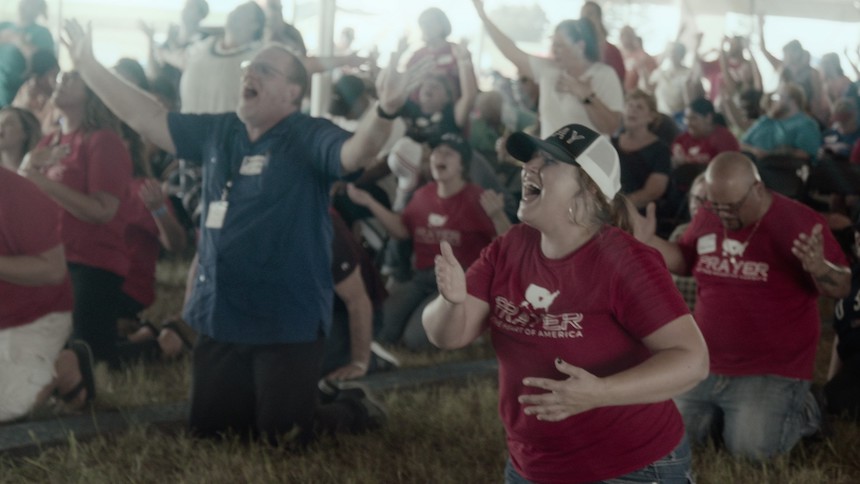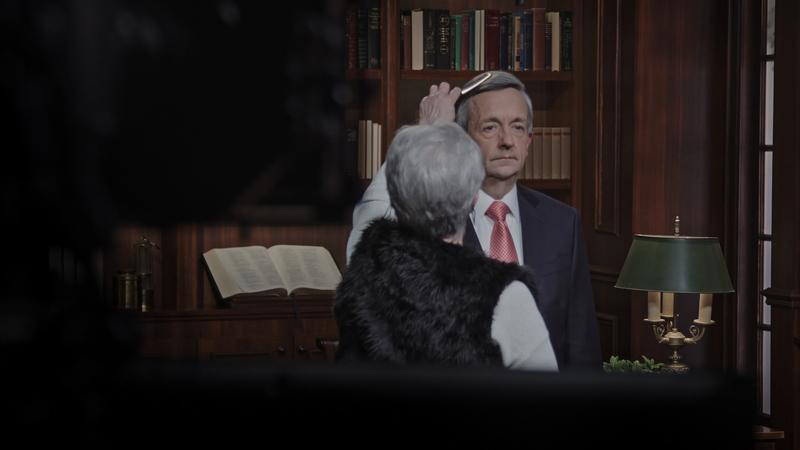Jihlava 2023 Review: PRAYING FOR ARMAGEDDON, Faith Moves Power
Tonje Hessen Schei and Michael Rowley's documentary examines the complex and often controversial intertwining of evangelical Christianity with U.S. politics, shedding light on its impact on global geopolitics.

The recent surge in populist politics and the precarious state of global geopolitics, already strained by multiple crises, create a tumultuous backdrop for Norwegian filmmaker Tonje Hessen Schei's latest documentary.
Assisted by co-director Michael Rowley, Schei delves into a less frequently explored aspect of contemporary issues, examining the intersection of evangelical Christianity and U.S. politics in Praying for Armageddon. The film brings a unique perspective to the conversation, offering insights into a topic that, while significant, has not been extensively covered in mainstream media.
Schei and Rowley investigate the intricacies of a movement that not only anticipates an impending apocalypse and the ensuing rapture but also actively yearns for it. The film reveals a troubling convergence of influential megachurch leaders and prominent political figures, highlighting an increasingly indistinct separation between church and state. The exploration raises critical questions regarding the underlying intentions and strategies within the upper tiers of American political structures.
The directors conduct an in-depth investigation into the impact of fundamentalist beliefs on American foreign policy, tracing connections from grassroots movements to the concealed corridors of power in Washington D.C. A critical focus of the film is the Israel-Palestine conflict, illustrating how evangelical ideologies exacerbate tensions in an already fragile region.
The film gains added relevance and gravity in the context of the recent escalation in Gaza, suggesting that certain U.S. evangelical groups may view such regional conflicts as a catalyst to hasten the rapture by further destabilizing the Middle East.
The documentary becomes increasingly disconcerting with the inclusion of figures such as Pastor John Hagee, who embodies the perilous blend of religion, politics, and apocalyptic anticipation. Hagee's connection with the Trump administration, especially highlighted by the decision to relocate the U.S. embassy to Jerusalem, underscores the significant influence of this movement. Such association provides a stark example of how religious beliefs can intersect with and impact political decisions.
The documentary reveals that, within certain Evangelical circles, geopolitical actions are perceived not merely as strategic maneuvers, but as the fulfillment of prophecy. This perspective is exemplified by the support for the displacement of Palestinians from Israel and the provision of military aid to Israel, funded by billions of dollars from American donors.
The film delves into initiatives like the Seven Mountains Mandate, showcasing the wide range of societal sectors these religious groups aim to influence. Particularly alarming are the revelations regarding the growing sway of evangelical Christian nationalists in the military, highlighting the extensive reach and potential consequences of this ideology.
Praying for Armageddon diverges from the style of conspiracy-themed documentaries like The Russian Woodpecker, which entertains speculative ideas and leaves viewers questioning the reality of its content. In contrast, "Praying for Armageddon" adopts a journalistic approach, offering a more grounded and fact-based narrative with limited scope for conjecture.
The filmmakers accompany journalist Lee Fang as he attempts to engage with representatives of evangelical churches that have governmental ties. Additionally, the documentary includes interviews with figures such as former preacher Frank Schaeffer, who was once a part of the movement but now speaks out against it, adding a layer of insider perspective to the film.
Praying for Armageddon resonates as an extension of the themes explored in Netflix's miniseries The Family, which delves into the history and political influence of a conservative Christian group known as the Family. The documentary underscores the dangers posed by any extremist or fanatical group that wields weapons, money, or power.
Simultaneously, it implicitly highlights the contradiction in the actions of those who profess to follow Jesus' teachings, yet have no reservations about harming others. Schei and Rowley's documentary provides a further unsettling examination of the current state of global affairs and the influences shaping geopolitical dynamics, contributing to an ever-looming doomsday narrative.
The Norwegian film enjoyed its Czech premiere at the Ji.hlava International Documentary Film Festival. Visit the official site for more information.








